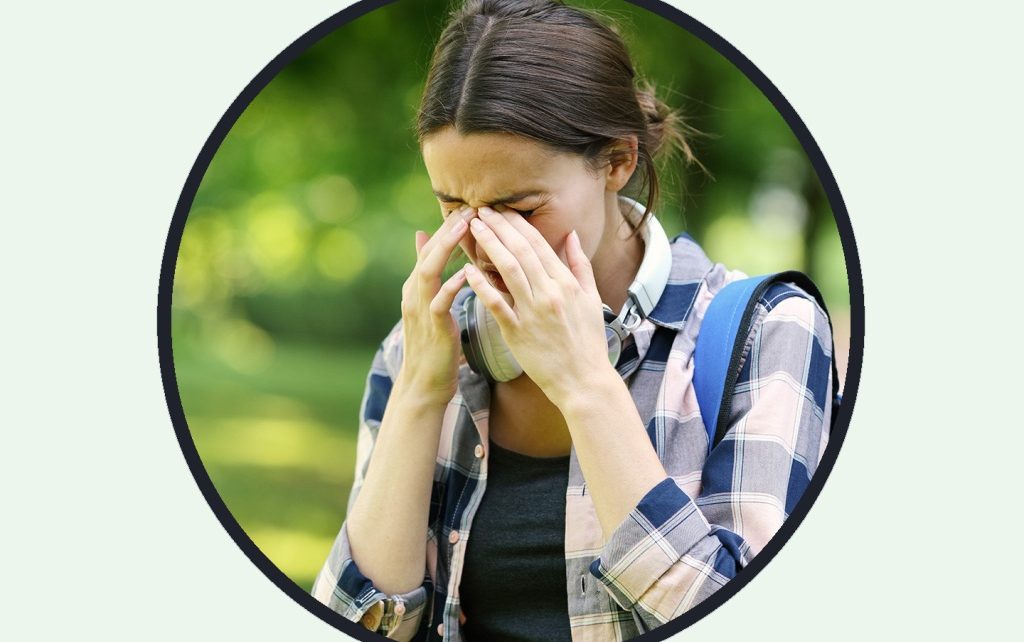If you purchase an independently reviewed product or service through a link on our website, SheKnows may receive an affiliate commission.
Spring brings longer brighter days, new beginnings and, unfortunately, allergies. Yes, it’s that time of year again. Sniffles, runny eyes, and a stubborn cough are the norm for those who suffer from seasonal allergies. So what gives?
“The springtime is most closely associated with the tree pollen season, which typically lasts from February until late May each year,” Dr. John M. James, MD, medical specialist and spokesperson, Asthma and Allergy Foundation of America (AAFA), tells SheKnows. “Pollen from common trees causes allergy symptoms. Tree pollen comes from many different types of trees, including juniper, oak, elm, maple, and mountain cedar.”
The symptoms of seasonal allergies vary widely for each person, but one of the most common symptoms is allergic rhinitis, otherwise known as “hay fever,” which Dr. James says it results from an allergic, inflammatory response that occurs in the nose and upper respiratory tract, including the back of the throat, roof of the mouth and the eyes.
Environmental allergens — such as pollen from trees, grasses, and weeds — typically cause seasonal allergies. Common symptoms of allergic rhinitis (hay fever) include:
- Itching of the nose, mouth, ears, and eyes
- Frequent runny nose (thin, clear discharge)
- Sneezing
- Significant nasal congestion or stuffiness
- Red, swollen eyes
In some people, allergies can trigger lower respiratory symptoms and asthma.
If you’re one of the over 50 million Americans who suffer from allergies, here are some tips on how to make allergy season a little less sniffy.
Use a topical nasal corticosteroid spray
“A topical nasal corticosteroid spray is the most effective treatment and is given daily during the allergy season,” says Dr. James. “In addition, these medications can work as a preventative measure before the allergy season starts.”
In addition, nasal decongestants can work but, Dr. James says, only for short periods of time.
Use a saline nasal spray
Dr. James recommends using a saline nasal spray
or rinse to keep your nasal passages moist and to flush out allergens, such as pollen, from your nose. These salt-water solutions can be dispersed into your nasal passages to help moisturize the area and draw out fluid in order to reduce the swelling in your blood vessels and help you to breathe better.
Try hypnosis
Eli Bliliuo, a certified hypnotist based in New York City, says he helps lessen, and in some cases eliminate, seasonal allergy symptoms.
“An allergy is a reaction. Your body comes into contact with something, and, for some reason, sees it as a threat. As a result, your body throws up a solid line of defense to fend off the threat – like sneezing, a runny nose, or a scratchy throat,” he says. “While you may consciously understand that your allergies are not necessary, your conscious mind is not capable of changing the situation all by itself.”
According to Bliliuo hypnotic directions, also known as suggestions, program the subconscious mind to respond appropriately which helps clients to minimize or eliminate seasonal allergy symptoms. “Clients experience formal hypnosis by following the direction of a hypnotist who will use a combination of guided imagery, confusion, deep breathing, overload, and body relaxation techniques. Contrary to popular belief, the client does not relinquish control and is aware and awake.”
In order to realize real change, Bliliuo says the subconscious mind must alter its perception of, and response to the various allergic triggers, which is possible through hypnosis.
“Hypnosis can help change the way that your subconscious perceives these allergic threats, and, eventually, enable you to change the way that your body responds to them.”
Stay indoors whenever possible
While staying indoors isn’t particularly welcomed after a long winter, it might be better for you than being outside and sneezing and sniffling. When indoors, Dr. James recommends closing windows and doors and using reliable filters in the home (such as High Efficiency Particulate Air (HEPA) filters).
Plan outdoor activities accordingly
“The peak pollen times of the day are early morning hours (dawn) and late in the day (dusk),” says Dr. James. “Plan activities accordingly. For example, exercising and working outdoors should be planned mid-day, if possible, to prevent exposure to high levels of pollen.”
When outdoors, he suggests wearing a quality face mask and then “shower after coming indoors and change clothing if possible because pollen from the outside might be on clothes.”
Add some honey into your diet
“One of the more nuanced ways to help with allergy season is to introduce locally-sourced honey into your diet on a regular basis,” says Dr. Anthony Puopolo, Chief Medical Officer at RexMD. “This helps expose your body to the pollen and allergens of your region, and may help you build up an immunity to some of your seasonal allergens.”
Stay well-hydrated
“Staying well hydrated is very important as this can be a good measure when your allergy response is in full force and at its peak,” says Dr. James. Keeping yourself hydrated helps your body to thin out the mucus in your nasal passages and reduce inflammation so make sure you’re drinking clean fluids, like water and herbal teas, throughout the day.
Consult an allergy doctor
When in doubt consult a professional if your allergies are interfering with your daily activities.
“Allergy shots or immunotherapy are a long-term and preventative treatment that can help people build tolerance to their allergies,” says Dr. James. “These are given under the direction of an allergy specialist and are administered in the clinic.”
Before you go, check out our favorite kid-friendly, all-natural cough and cold remedies:

Source: Read Full Article



